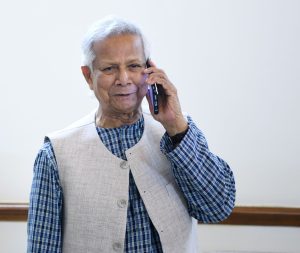Since the mass uprising in July-August, which forced the resignation of former Prime Minister Sheikh Hasina and her exit from Bangladesh, the country is being ruled by an interim government led by Dr. Muhammad Yunus.
One of Yunus’ important decisions since being appointed the interim government’s chief adviser is the establishment of six reform commissions. These commissions were set up to address corruption and reform the country’s election system, police administration, judiciary, public administration, and constitution.
In an interview with the German broadcaster DW, Yunus said that Hasina had destroyed almost all institutions in Bangladesh and that his government wanted to “establish citizens’ rights, human rights, democracy and everything that goes with a good governance.” Yunus made a valid point, as evidenced by the high levels of public distrust toward the police.
The mass uprising, for example, exposed severe police brutality. Officers fired live bullets at civilians and students. Amid allegations of torture, forced disappearances, and mass imprisonment, public outrage surged, leading to attacks on police stations and personnel across the country. A number of police officers died in these attacks.
Following the change in government, many policemen in Bangladesh who were known to be brutal and partisan either fled, were jailed, or went into hiding.
In another interview, Yunus said his government is “initiating reform towards democratization” hinting that Bangladesh’s transition to democracy will take place after the reform.
The reform commissions began work in October and are set to engage with key stakeholders, including civil society members and political parties. They will submit their reports outlining roadmaps for reforms within the next three months. Based on the reports, Yunus will initiate another set of wider consultations with political parties and civil society members. He will then map out and execute some reforms before organizing a free and fair election, which is likely to be held in 2025.
Though there is no public mandate for setting up these reform commissions, the move has not triggered much opposition, indicating broad public support for “fixing” the system.
Professor Mohammad Mozahidul Islam at the Department of History in Bangladesh’s Jahangir Nagar University supports Yunus’ reform agenda. Without reform of the country’s institutions and political culture, Bangladesh could once again end up under autocratic rule like that of the Hasina regime, he told The Diplomat.
However, some have expressed their misgivings over the formation and scope of the reform commissions. According to Tasneem Khalil, editor-in-chief of the investigative news site Netra News, reform must be carried out by an elected and political government, not, he says, an unelected and technocratic government like that of Yunus. The question of inclusivity in these reform commissions is a contentious issue as well, since in Khalil’s view “these reform commissions are dominated by Bengali Muslim men, which is not representative of Bangladesh’s diverse demographic.”
It should also be noted that recruitment into the reform commissions was not transparent; commission members were handpicked by the interim government.
“We don’t know how these commissions were formed and who made the selections. As far as I know, there was no public consultation whatsoever before these commissions were formed,” Khalil told The Diplomat.
Dismissing these criticisms, Yunus’ press secretary, Shafiqul Alam, told The Diplomat that the interim government has dedicated a substantial amount of time to forming these commissions and bringing together top experts to ensure effective change.
“Our core mandate is reform, and that’s what the people demand. This call for reform is rooted in the public’s disillusionment with Sheikh Hasina’s government, which entrenched a brutal authoritarian regime. We recognize and fully support the people’s desire for meaningful change,” Alam said.
However, there are issues of concern. The reform commissions are primarily led by individuals with backgrounds in academia, NGOs, and government, rather than in politics. This could create a disconnect between reform commissions and the political parties.
The Bangladesh Nationalist Party (BNP), a key stakeholder in Bangladesh politics, which is likely to form the next elected government, has been cautious in its public response to the reform agenda.
Mahdi Amin, an adviser to Tarique Rahman, acting chairman and the BNP’s de facto leader, believes that a pragmatic roadmap with measurable deliverables detailing the scopes of reforms is needed. “We recognize the interim government’s limitations in terms of capacity and experience, and suggest robust engagement and dialogue with the political parties to make this reform agenda a collaborative project. There is a nationwide aspiration for a complete democratic transition that will ensure a fair and credible election,” Amin told The Diplomat.
Yunus’ reform agenda promises substantial and meaningful change. However, it will come under more scrutiny from the public and political parties in the coming days. Amid skyrocketing prices of essential commodities and weakening law and order situations, a multitude of protests have erupted across the country. Time is not on Yunus’ side as public patience with his administration may wane soon. He must keep public and political support on his side as he moves forward on the reform process.

































